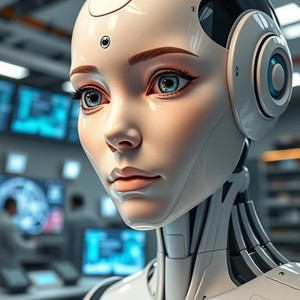Sophia, the world-famous humanoid robot, has captivated audiences with her strikingly human-like appearance and conversational abilities. Developed by Hanson Robotics, Sophia represents a groundbreaking fusion of artificial intelligence (AI) and robotics, sparking both excitement and deep discussions about the future of AI in our daily lives.
“Sophia is more than just a robot; she is a testament to human creativity and our relentless pursuit of understanding intelligence.”
A Humanoid Marvel
What sets Sophia apart from traditional robots is her lifelike design and expressive features. Unlike rigid, mechanical-looking robots, she boasts human-like facial expressions, realistic skin, and advanced AI-driven interactions. Her ability to smile, frown, and maintain eye contact makes conversations with her feel remarkably natural.
But beyond her aesthetic appeal, it’s Sophia’s intelligence that truly makes her stand out.
More Than Looks: Sophia’s AI Superpowers
Sophia isn’t just a talking machine—her AI enables her to learn, adapt, and engage in meaningful conversations. Here’s what makes her special:
- Natural Language Processing (NLP) – Sophia understands and responds to complex questions, making her interactions feel surprisingly human.
- Facial Recognition – She can recognize people, remember faces, and tailor conversations accordingly.
- Machine Learning – Sophia continuously improves, learning from past interactions to become more intelligent over time.
- Emotional Intelligence – She can detect and mimic emotions, responding with appropriate facial expressions and tone.
These features allow Sophia to engage in discussions ranging from simple small talk to deep philosophical debates—something that sets her apart in the world of AI.
What Does Sophia Mean for the Future?
Sophia’s existence sparks a bigger conversation about the evolving relationship between humans and AI. As robots like her become more advanced, we must consider:
🔹 How will humanoid robots integrate into daily life?
🔹 What ethical boundaries should be in place for AI?
🔹 Will AI-driven robots replace human jobs, or create new opportunities?
Sophia herself has been at the center of these debates. She was even granted citizenship in Saudi Arabia, making her the first robot in history to receive such a status. This milestone raised questions about AI rights and responsibilities, pushing society to rethink what it means to be “alive.”
The Spark of Innovation
Beyond the hype, Sophia represents a catalyst for innovation. She’s not just a technological marvel—she’s inspiring new advancements in AI, robotics, and human-robot collaboration. From healthcare and education to customer service and entertainment, robots like Sophia could play a pivotal role in shaping our future.
As AI technology continues to evolve, Sophia may be just the beginning of a new era where humans and machines interact seamlessly. Whether this future excites or concerns you, one thing is certain: Sophia is redefining what’s possible.rs to push the boundaries of what is possible. As we move forward, it is essential to approach AI development with a focus on ethics, safety, and the well-being of humanity.
